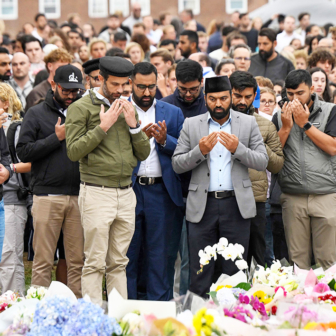I have just spent a week in Israel and, while it may not look as if much has changed — the grinding war in the Gaza Strip continues to grind — I felt something new there for the first time since 7 October 2023. It is premature to call it a broad-based antiwar movement, which can happen only when all the Israeli hostages are returned. But I did see signals flashing that more Israelis, from the left to the centre and even parts of the right, are concluding that continuing this war is a disaster for Israel morally, diplomatically or strategically.
From the political centre, former prime minister Ehud Olmert wrote an essay in the newspaper Haaretz in which he pulled no punches against prime minister Benjamin Netanyahu and his coalition.
“The government of Israel is currently waging a war without purpose, without goals or clear planning and with no chances of success,” Olmert argued. “What we are doing in Gaza now is a war of extermination: indiscriminate, limitless, cruel and criminal killing of civilians.” His conclusion: “Yes, Israel is committing war crimes.”
From the right, you have the likes of Amit Halevi, a member of Netanyahu’s own right-wing Likud party, who is staunchly pro-war but thinks its execution has been bungled. Halevi had his membership on the Knesset’s foreign affairs and defence committee suspended by Netanyahu’s coalition after he voted against a proposal to extend the government’s ability to issue emergency call-up orders for Israeli reservists. In an interview with the newspaper Yediot Ahronot following his dismissal, Halevi said, “This war is a deception. They lied to us about its achievements.” Israel has “been fighting a war for twenty months with failed plans,” and it “is not succeeding in destroying Hamas.”
And from the left, Yair Golan, the leader of Israel’s liberal alliance, the Democrats, stated in an interview with Israel Radio: “Israel is on the way to becoming a pariah state, like South Africa was, if we don’t return to acting like a sane country. A sane country does not fight against civilians, does not kill babies as a hobby, and does not set itself the aim of expelling populations.”
After the “hobby” comment drew an outcry, Golan, himself a Gaza war hero, clarified that he was not blaming the military but rather the politicians who were extending the war for reasons that no longer have anything to do with Israel’s national security needs.
While Golan probably should have used a different word so as not to give Israeli rightists an easy way to discredit him, the truth is this: virtually no independent foreign journalists have been allowed to report first-hand from Gaza. When this war is over and Gaza is saturated with international reporters and photographers free to roam, the level of death and destruction is going to be fully reported and pictured — and that is going to be a very bad time for Israel and world Jewry.
So Golan was right to warn his nation — bluntly — to stop now, forge a ceasefire, get the hostages back, get an international and Arab force into Gaza, and deal with the remnants of Hamas later. When you are in a hole, stop digging.
Unfortunately, Netanyahu has insisted on continuing to dig, claiming that he can bomb Hamas into giving up its remaining twenty or so living Israeli hostages — and because the religious-nationalist members of his coalition have essentially told him that if he stops the war, they will topple him. So the Israeli military is going after more and more secondary targets, and the result is Gaza civilians being killed every day.
Amos Harel, the military analyst for Haaretz, explained why: “Many bombing runs are actually assassination attempts against Hamas leaders, often when they’re with their families. And these officials no longer live in private houses or apartment buildings — they’re usually in the crowded tent camps with thousands of civilians. Even when the army declares multiple steps of caution, these attacks result in massive killing.”
It is not only, and indeed not even mostly, the rise in Gaza civilian casualties that is turning more and more Israelis against the war. It’s simply that the war has worn down the whole society. The signs, Harel notes, are everything from “an increasing number of suicides (which the army doesn’t report) to families that are breaking up and businesses that are collapsing. The government conveniently ignores these developments and scatters promises of victory instead.”
If many Israelis feel trapped by their own leaders, many people in Gaza clearly feel the same. Polling in Gaza is obviously difficult, but the antiwar movement there seems to be stirring as well — although there you can get killed by Hamas for protesting. A survey by the independent, Ramallah-based Palestinian Center for Policy and Survey Research of people across the Gaza Strip found that 48 per cent supported the anti-Hamas demonstrations that erupted in several places in recent weeks.
Indeed, be assured that it’s not only some Israeli leaders who will face a reckoning when the guns of Gaza finally fall silent. Hamas’s leaders will live in infamy. They attacked Israeli border communities on 7 October 2023 and, when Israel predictably retaliated, they essentially offered up Gaza’s civilians as a collective human sacrifice to win global sympathy for their cause — while Hamas leaders hid in tunnels and abroad. Hamas is still operating, but now Gaza is unliveable. Yet Hamas’s leadership is still stubbornly saying it will not turn over all its remaining live hostages unless Israel agrees to leave Gaza and return to an open-ended ceasefire.
Really? Israel should leave all of Gaza and accept a ceasefire? What a great idea. If Hamas achieved that “victory,” it would mean that Hamas fought this entire war — losing tens of thousands of fighters and civilians and having few buildings in Gaza left intact — in order to get back to exactly what it had on 6 October 2023: a ceasefire and Israel out of Gaza.
For this alone, history will remember Hamas leaders as mendacious fools. They thought they were unleashing an apocalypse on Israel and instead unleashed an apocalypse on their own people that also ended up giving licence to Netanyahu to destroy their ally, Hezbollah, in Lebanon and Syria, which weakened Iran’s grip on both of those nations, as well as on Iraq, and helped drive Russia out of Syria. It was a rout of the Iran-led “resistance network.”
But here’s the rub. As a result of Netanyahu’s military operations, Lebanon, Syria, Iraq and the Palestinian Authority in Ramallah — not to mention Saudi Arabia — are all now much freer to join the Abraham Accords and normalize relations with Israel to a degree they never were when Iran’s regional mercenary network was so powerful.
Yes, Netanyahu made that happen! But he also never misses an opportunity to miss an opportunity for peace. Netanyahu today staunchly refuses to harvest what Netanyahu has sown. He will not do the one thing that would unlock the politics of the whole region: open a road, no matter how long, to a two-state solution with a reformed Palestinian Authority.
No wonder Donald Trump doesn’t want to waste time with him — he can’t make any money from him, and he won’t allow Trump to make any history with him.
The more I would argue to Israelis that Netanyahu is making a historic mistake — trading peace with Saudi Arabia for peace with the far-right extremists who keep him in power — the more they would ask me “Do you think Trump can save us?” That question is the ultimate sign that your democracy is in trouble.
I had to explain that Trump goes to countries that give him things — cash, 747s, $Trump meme coin and Official Melania Meme sales, arms purchases, hotel deals, golf courses, AI data centres — and not countries that ask him for things, like Israel.
In fairness to Trump, he probably has no idea how much Israel has internally changed. Even many American Jews don’t understand how big and powerful the ultra-Orthodox and religious-settler-nationalist community in Israel has grown and how much it sees Gaza as a religious war.
“Bibi is actually their pawn, not the real player,” explained Avrum Burg, a former speaker of the Knesset, referring to the religious-nationalist-settler right in Israel. “You tell them Israel could have peace with Saudi Arabia and they will shrug and tell you that they are waiting for the Messiah. You tell them they could have peace with Syria, and they will tell you the Jewish people already own Syria — it’s part of Greater Israel. You tell them about international law, they will tell you biblical law. You will tell them Hamas, they will tell you Amalek [a biblical enemy of the Israelites].”
The real divide in Israel today, concluded Burg, who teaches about relations between religion and state, is not between conservatives and progressives. “It’s between the Jewish tribe and the democratic tribe. And the Jewish tribe is now winning. If Zionism was originally the triumph of secular nationalism over religious Judaism, what is happening to today is the resurgence of religious-nationalist Judaism over democracy.”
And so, after a week, I flew home from off-Broadway — Israel — only to discover that the same play, only bigger, is running on Broadway, in America. It is eerie to watch how Trump and Netanyahu are using a similar playbook to undermine their respective democracies. My only question is whose authoritarian impulses will trigger a full-blown constitutional crisis first.
Each leader stands accused of trying to undermine his country’s courts and the “deep state’’ — i.e., all the institutions that uphold the rule of law. In Trump’s case, it’s effectively to enrich himself personally and shift wealth in the country from the least privileged to the most privileged. In Netanyahu’s case, it’s effectively to escape the many corruption charges against him and shift power and money away from the democratic, moderate Israeli centre to the settlers and the ultra-Orthodox. That group will keep Netanyahu’s coalition in office as long as he excuses the ultra-Orthodox from fighting in Gaza and allows the settlers to continue their march to annex the West Bank today and Gaza tomorrow.
When Netanyahu was elected in November 2022 and began forming his Jewish supremacist coalition, I wrote a column the next morning headlined “The Israel We Knew Is Gone.’’ I hope I was premature — but I hope even more that I won’t soon have to write the same column about America.
The year 2026 will have a lot to say about whether the Netanyahu and Trump cults can be contained. That year, Netanyahu will have to hold national elections, and Trump will have to face the midterms. Those committed to democracy and decency in both countries have one job between now and then: organise, organise, organise to win power.
Nothing else matters. And everything is riding on it. •
This article originally appeared in the New York Times.




